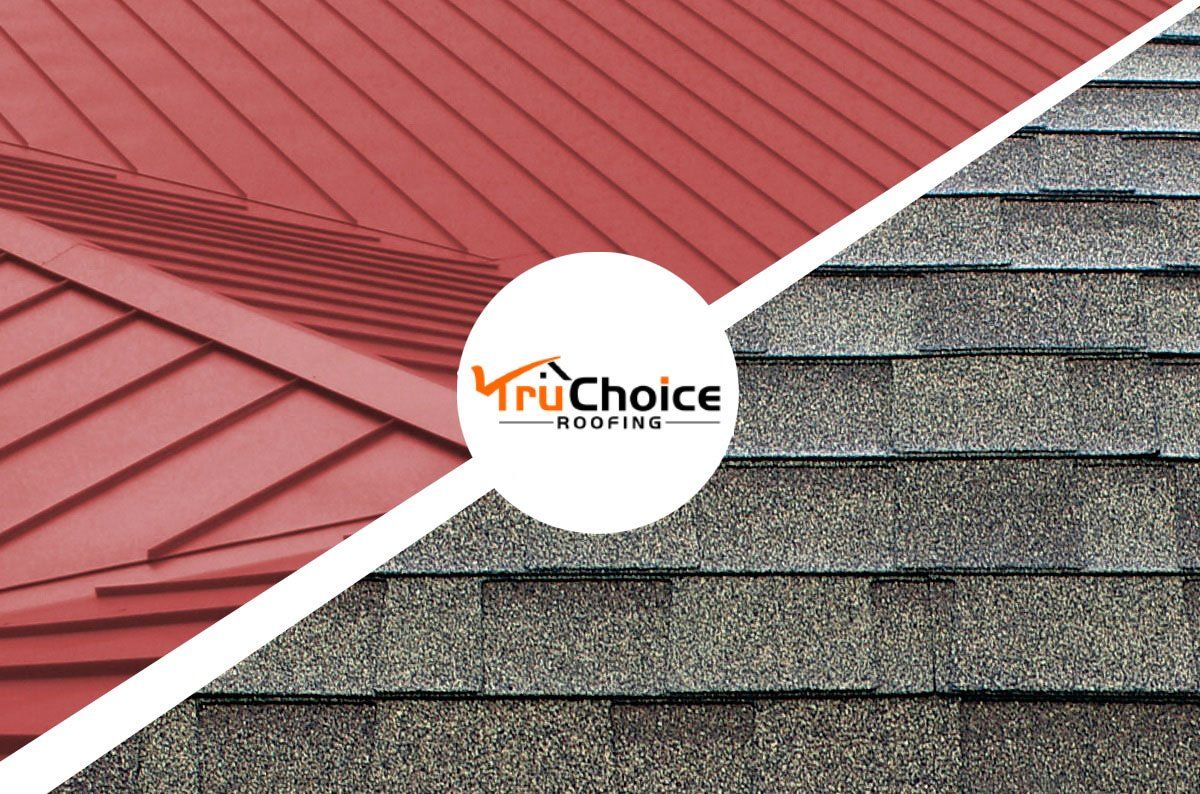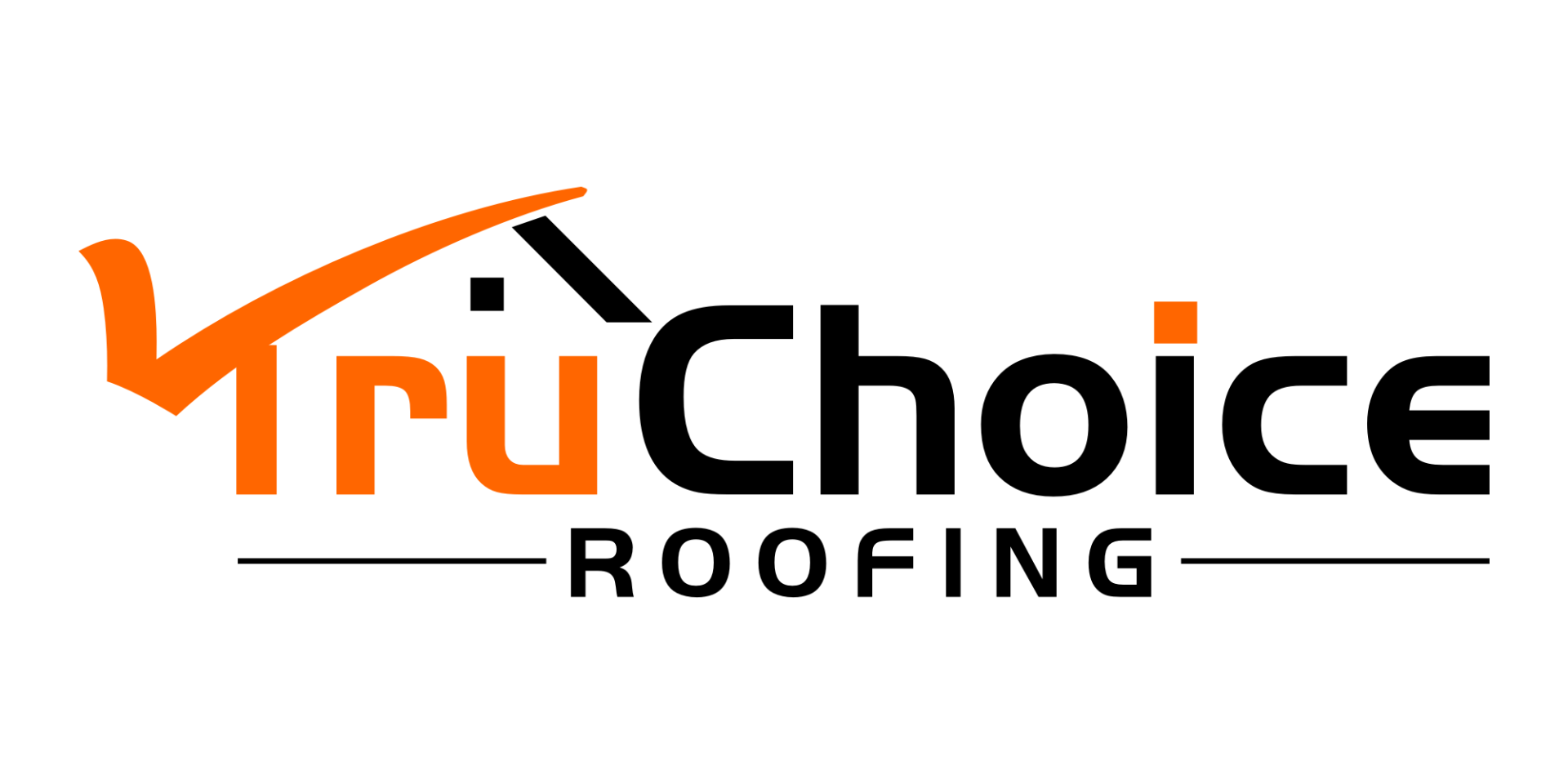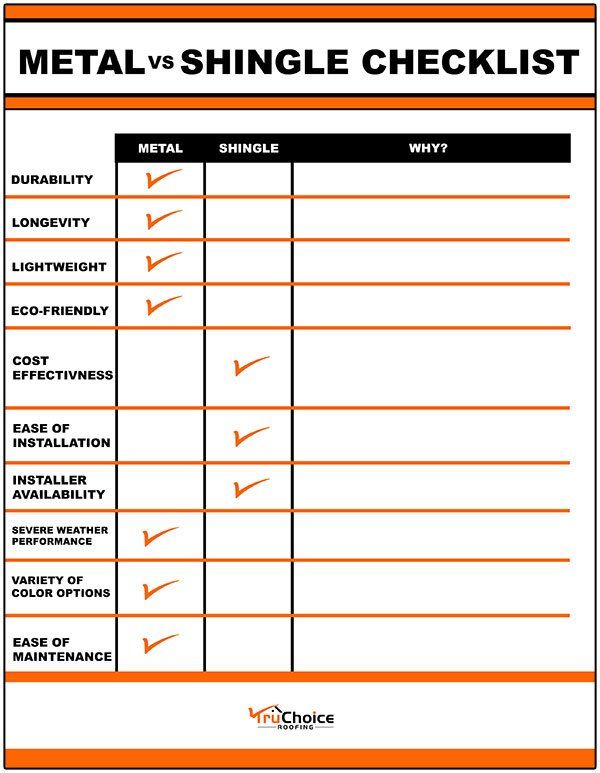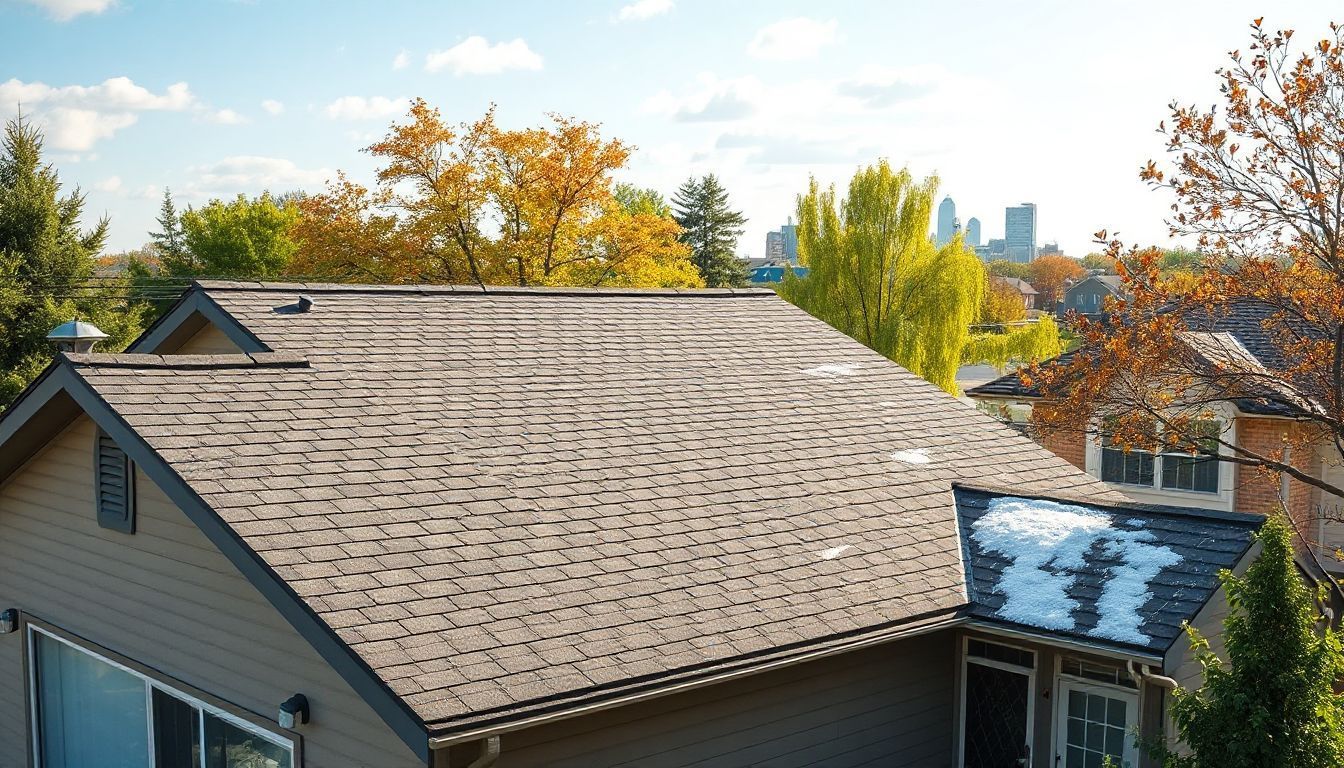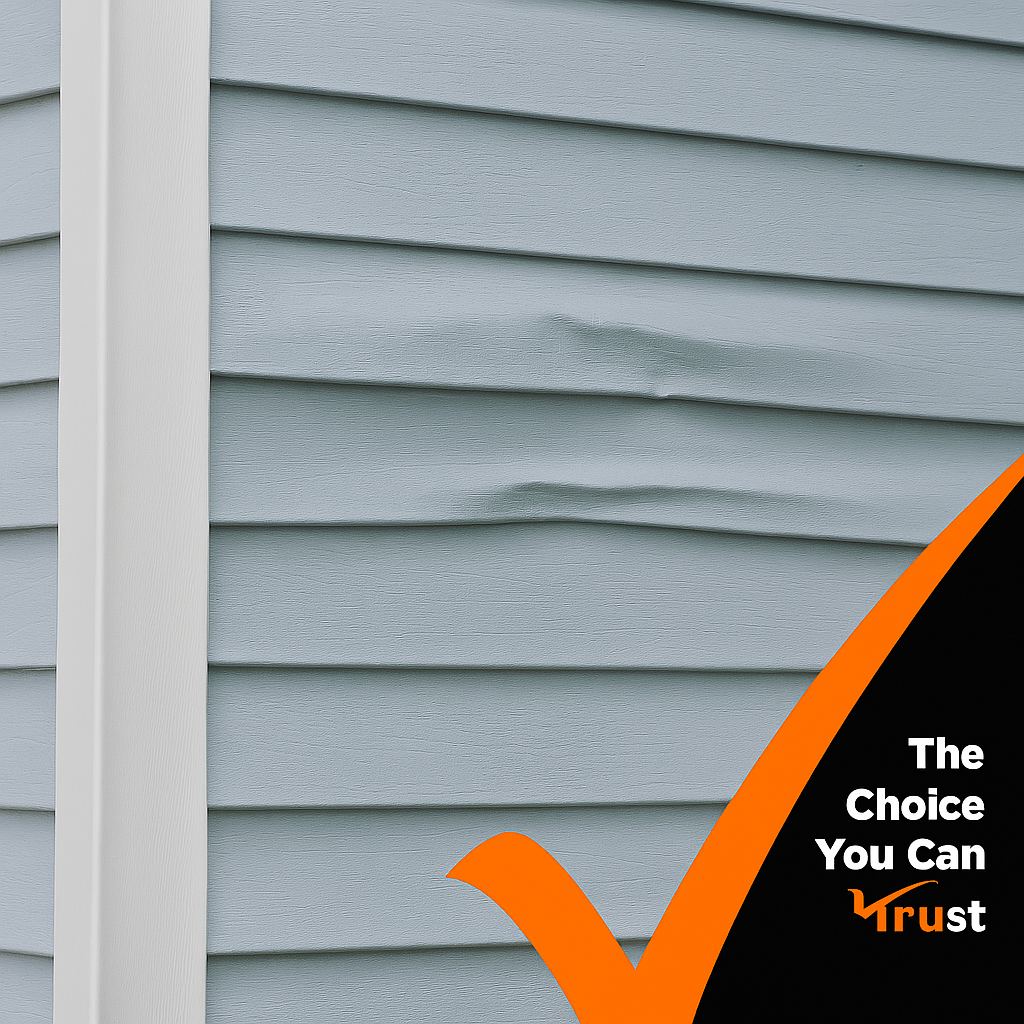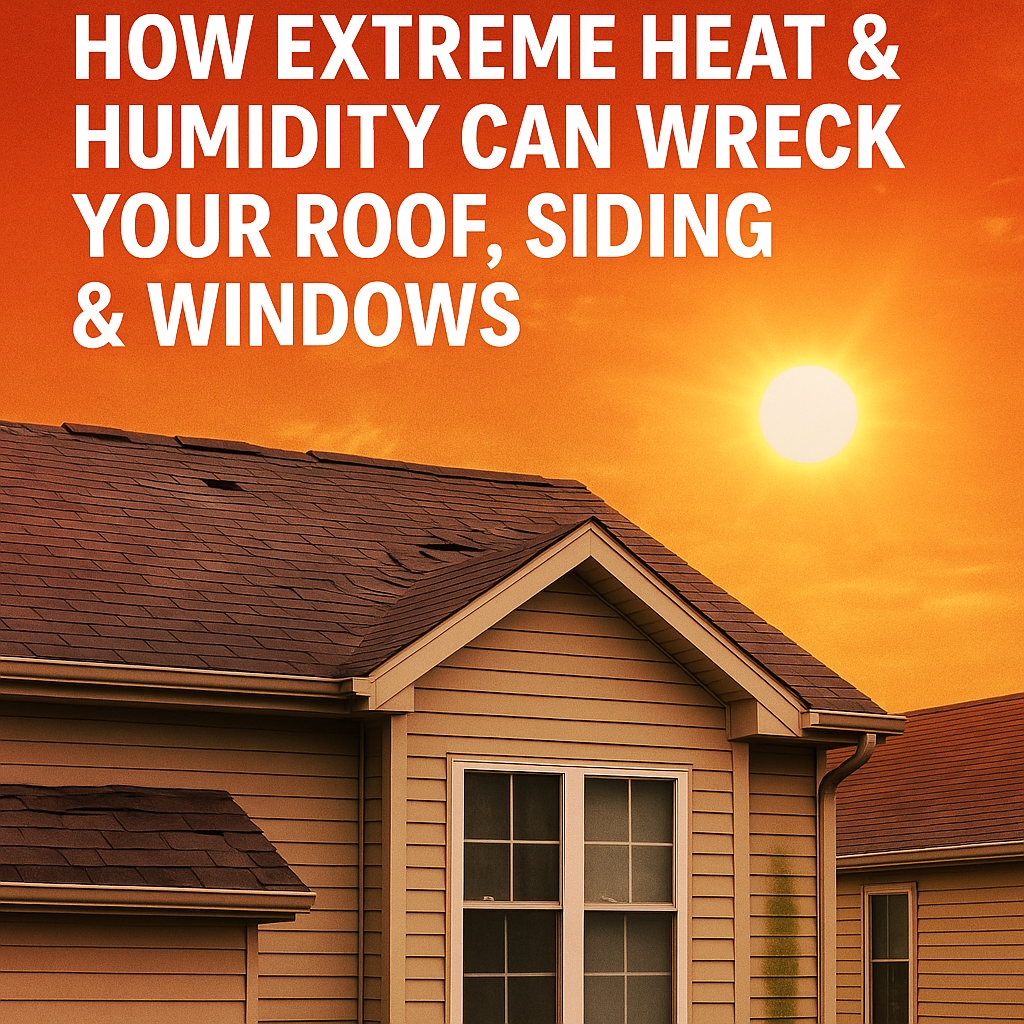Metal Roofing vs. Shingle Roofing: Which Should You Choose?
Both metal and shingle roofs have pros and cons, but ultimately, it comes down to what's best for your home and your budget.
When it comes time to replace your roof, you may wonder whether metal roofing or shingle roofing is the better option. Both have their pros and cons, but in the end, the choice comes down to what works best for your home and your budget. Here at TruChoice Roofing, we will explore the differences between metal and shingle roofing so that you can make an informed decision when it comes time to replace your roof. We think it's important that you understand all the options available to you and how they will affect your home.
So, let's take a closer look at metal roofing vs. shingle roofing.
Why Should You Invest In Roofing?
Roofing is a critical component of any home or commercial building and should be given the attention it deserves. A quality roof can last for decades, but it needs to be properly installed and maintained to achieve this level of longevity. Investing in roofing is an excellent way to protect your property from the elements and keep your family or employees safe. It's also a great way to boost the value of your home or business. A new roof can make a big difference in curb appeal, and it can help you save money on energy bills by improving insulation. Investing in quality roofing is always a smart choice whether you're building a new home or simply replacing an old roof.
Now that we've talked about the importance of roofing let's compare metal and shingle roofing to see which one is right for you.
Metal Roofing
Metal roofing is an increasingly popular option for residential and commercial properties. These roofs are durable and eco-friendly and can last for decades with proper installation and maintenance. In addition, metal roofs are very low maintenance and fire resistant, two more great reasons to choose metal roofing for your home. When it comes to aesthetics, metal roofs can be adapted to fit any style of home, from traditional to contemporary. And because metal roofs are so energy efficient, they can help to lower your monthly energy bills. So if you're looking for stylish and practical roofing, metal roofing is the perfect option.
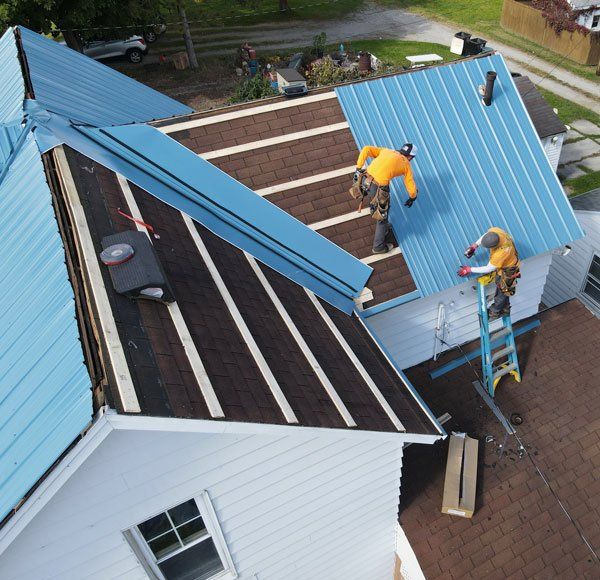
Advantages of Metal Roofing
Numerous advantages of metal roofing make it a desirable alternative for both residential and commercial buildings. Metal roofing provides dependable protection and peace of mind because of its outstanding toughness, endurance, and tolerance to different weather situations. Additionally, those looking for a long-term and sustainable roofing option will find its sleek aesthetic, energy efficiency, and potential cost savings to be attractive features.
1) Lightweight:
Given that most houses are designed to support an asphalt shingle roof, adding the weight of a metal roof can be a concern for some homeowners. However, modern metal roofs are quite lightweight and can usually be installed without making any structural changes to the home. In fact, many metal roofs weigh no more than traditional asphalt shingles, making them a great option for homes that can't support the weight of heavier roofing material.
2) Durable:
Metal roofs are designed to last decades and withstand wind, hail, and other severe weather conditions. In fact, many metal roofs come with a warranty of up to 50 years, making them one of the most durable roofing options on the market. Metal roofs are also non-porous, so they won't rot or deteriorate like other roofing materials.
3) Energy-Efficient:
Metal roofs reflect heat away from home, which helps keep the interior cool in the summer and reduces the energy needed to operate air conditioning units. In the winter, metal roofs help to retain heat and prevent heat loss through the attic, which can help to lower heating costs.
4) Environmentally Friendly:
Metal roofs are also becoming increasingly popular due to their environmental benefits. They are 100% recyclable and can even help to reflect heat away from your home, making it cooler in the summertime. This reduced reliance on air conditioning can save you money on your energy bills and help to reduce your carbon footprint.
5) Low Maintenance:
Metal roofs are virtually maintenance-free and don't require special care or cleaning products. In addition, metal roofs are resistant to fire and pests, so there's no need to worry about termites or other pests damaging your roof.
6) Aesthetic Appeal:
Metal roofing also has a great deal of aesthetic appeal. Metal roofs come in a variety of colors and styles, so you can find an option that compliments your home's exterior perfectly. Additionally, metal roofs are known for their clean lines and uniform appearance. Metal roofing is a great choice if you're looking for a roof that will add beauty and value to your home.
7) Fire Resistance:
Metal roofs are known for their fire resistance, a major advantage in areas prone to wildfires. The non-combustible nature of metal means that it is much less likely to catch fire than other roofing materials, such as asphalt shingles. Additionally, metal roofs can help protect your home from lower-intensity fires, such as those caused by lightning strikes or sparks from a nearby grill. As a result, you can feel confident that your home is well-protected against the threat of fire when you have a metal roof.
8) Weathering Performance:
Metal roofs are designed to withstand the harshest weather conditions, including high winds, hail, and even fire. Metal roofs are often rated for wind speeds up to 120 mph and can resist impacts from hail up to 2.5 inches in diameter. Additionally, metal roofs are non-combustible and can help to protect your home in the event of a wildfire. As a result, metal roofs offer superior protection against the elements and can help to keep your home safe and dry.
9) Increased Property Value:
A metal roof can increase the value of your home or commercial property. Because of the long life expectancy of metal roofs, they are often considered valuable addition to any property. In addition, metal roofs can add curb appeal and give your home or business a more modern look.
10) Roofing Over or Retrofitting Over Old Roof:
Because metal roofs are so lightweight, they can often be installed over an existing roof without the need for additional structural support. This is called a "roof-over" or "retrofit" and can save you time and money on your roofing project. In addition, installing a metal roof over an old roof can help extend your roof's life and protect your home or business from the elements.
11) Insurance Benefits:
Some insurance companies offer discounts for homes and businesses with metal roofs. This is because metal roofs are known for their durability and fire resistance, which can help to reduce the risk of damage to your property. As a result, you may be able to save money on your insurance premiums by installing a metal roof.
Disadvantages of Metal Roofing
Despite its numerous advantages, metal roofing does come with certain drawbacks that should be considered. These may include initial installation costs, potential noise during rain or hailstorms, and the need for proper insulation to prevent heat conductivity. However, with careful planning and proper maintenance, these disadvantages can be mitigated, making metal roofing a viable and worthwhile investment.
1) Cost:
The initial cost of metal roofing is often one of the biggest disadvantages. Metal roofing costs more than asphalt shingles, and the price can vary significantly depending on the type of metal you choose. In addition, installing a metal roof tends to be more expensive than installing other types of roofing due to the special tools and equipment required. As a result, it can take longer to recoup your investment in a metal roof than in some other types of roofing.
2) Noise:
Another disadvantage of metal roofing is the increased noise level. When it rains or there is a strong wind, you will definitely hear the sound of the rain or the wind hitting your metal roof. This can be quite bothersome, especially if you are trying to sleep. However, there are ways to mitigate this problem. One option is to install acoustic underlayment, which can help to reduce noise levels. Another option is to choose a metal roofing material with a higher STC rating, indicating that it will block out more sound.
3) Limited Qualified Contractors:
Because metal roofing is not as common as other types of roofing, fewer qualified contractors can install them. As a result, finding a contractor who is experienced in installing metal roofs can be difficult. This can often lead to higher installation costs and longer wait times for your roofing project.
4) More Labor Intensive:
Installing a metal roof is more labor-intensive than installing other types of roofing. This is because special tools and equipment are required to install metal roofs. As a result, installing a metal roof can take longer than other types of roofing. Additionally, because metal roofs are more difficult to install, the risk of mistakes and problems during installation increases.
5) Vulnerability to Lightning Strikes:
Metal roofs are more vulnerable to lightning strikes than other types of roofing. This is because metal conducts electricity, which can cause a fire if a lightning strike hits your roof. However, there are ways to mitigate this risk. One option is to install a lightning protection system, which can help to redirect the electricity away from your roof. Another option is to choose a metal roofing material with a higher fire rating, which will help to resist fires caused by lightning strikes.
6) Damage From Hail:
While metal roofs are very durable, they can be damaged by hail. This is because hail can dent or crack metal roofs. However, the risk of hail damage can be reduced by choosing a metal roofing material with a higher impact rating. Additionally, installing impact-resistant insulation under your metal roof can help to absorb the force of hail, reducing the likelihood of damage.
7) Oil Canning:
Oil canning is a type of distortion that can occur in metal roofs. This is because metal roofs are not perfectly flat, and the weight of the metal can cause them to buckle slightly or wave. While this is not a structural issue, it can be cosmetic and make your roof look less attractive. Oil canning is more likely to occur in metal roofs that are not properly supported, so it is important to make sure that your roof is installed correctly.
8) Corrosion:
Metal roofs can be susceptible to corrosion, especially if they are not made of stainless steel. Corrosion can cause your roof to leak, and it can also reduce the lifespan of your roof. To prevent corrosion, it is important to choose a metal roofing material that is resistant to corrosion. Additionally, you can install galvanized steel flashing around any areas where water is likely to come into contact with your roofs, such as chimneys and skylights.
9) Algae Growth:
Algae can grow on metal roofs; while it is not harmful, it can be unsightly. Algae growth is more common in humid climates, so if you live in an area with high humidity, you may need to take steps to prevent algae growth on your roof. One option is to choose a metal roofing material treated with an algae-resistant coating. Another option is to install copper flashing around your roof, as copper is known to inhibit algae growth.
10) Insurance Drawbacks:
Metal roofs can sometimes have drawbacks when it comes to insurance. This is because metal roofs are more susceptible to lightning damage and can also be more difficult to repair than other types of roofing. As a result, some insurance companies may charge higher premiums for metal roofs. However, there are ways to offset this cost. One option is to install a lightning protection system, which can help to reduce the risk of damage from lightning strikes. So, while metal roofs may have some drawbacks, they also have a number of advantages that make them a good choice for many homeowners. If you are considering a metal roof, be sure to weigh the pros and cons carefully to decide if it is the right choice for your home.
Shingle Roofing:
Shingle roofing is a popular choice for many homeowners because of its aesthetic appeal and its ability to protect homes from the elements. Shingles are made of different materials, including asphalt, fiberglass, or clay, and they can be either shingled or flat. Shingles are available in a variety of colors, textures, and sizes, so you can choose the look that best suits your home. Most shingle roofs have a lifespan of 20-30 years, and they are relatively easy to install and repair.
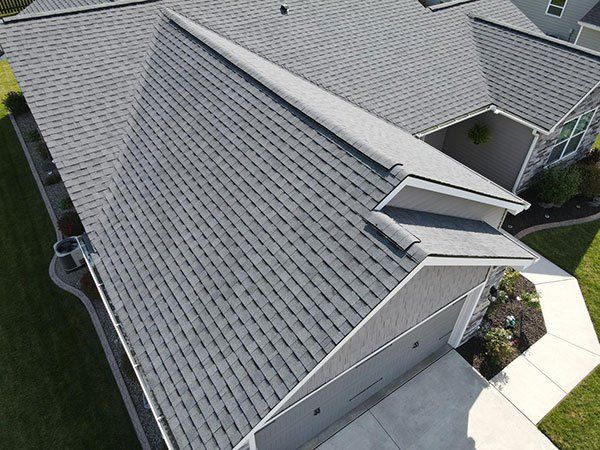
Advantages Of Shingle Roofing:
Shingle roofing is a well-liked and frequently-used roofing material that provides both residential and commercial establishments with a number of benefits. It is a cost-effective solution for a variety of budgets and architectural styles due to its accessibility and adaptability. Additionally, shingle roofing offers superior defense against severe weather elements like wind, rain, and snow, providing long-lasting durability and homeowners' peace of mind.
1) Economical in the Short Term:
When it comes to roofing, there are a lot of options to choose from. Shingle roofing is a popular choice for many homeowners because it is economical in the short term. Shingles are made from a variety of materials, including asphalt, wood, and metal. They are also relatively easy to install, which can save on labor costs. In addition, shingles have a long lifespan and can last for 20-30 years with proper care and maintenance. As a result, shingle roofing is an attractive option for those looking for an affordable roofing solution.
2) Low Maintenance:
Another advantage of shingle roofing is that it is low maintenance. Unlike other types of roofs, shingles do not require regular cleaning or sealing. They also resist fire and pests and can withstand extreme weather conditions. As a result, shingle roofing is a great option for those who want a roof that will last for many years with little upkeep.
3) Aesthetically Pleasing:
In addition to being economical and low maintenance, shingle roofing is also aesthetically pleasing. Shingles come in a variety of colors and styles, so you can find an option that matches the look of your home. Whether you want a traditional look or something more unique, shingle roofing can give your home the curb appeal you desire. Consequently, it is no wonder that shingle roofing is such a popular choice among homeowners.
4) Wide Variety of Styles:
Shingle roofing comes in a wide variety of styles, which can help you create the look you want for your home. Asphalt shingles are available in a variety of colors and textures, and they can be installed in a number of different patterns. In addition, wood shingles can add a touch of elegance to any home. No matter your style preferences, you will surely find a shingle roof that meets your needs.
5) Easy to Install:
Asphalt shingles are one of the easiest roofing materials to install. They are also lightweight, which makes them easy to work with. Wood shingles are another easy-to-install option. In fact, many people choose to install shingle roofs themselves in order to save on installation costs.
6) Less Expensive Repairs:
Shingles are also less expensive to repair than other types of roofing materials. Asphalt shingles can be replaced individually, and wood shingles can be repaired with a little elbow grease. Consequently, shingle roofs are a great option for those who want an affordable roof that is easy to maintain.
7) More Installers:
Another advantage of shingle roofing is that there are more installers available. Asphalt shingles are one of the most popular roofing materials, so there are a number of companies that specialize in their installation. Wood shingles are also becoming more popular, so there are a number of experienced installers to choose from. Regardless of your location, you should be able to find a qualified installer to install your shingle roof.
8) More Warranty Coverage:
Shingle roofs also tend to have more warranty coverage than other types of roofing materials. Asphalt shingles usually come with a 20-year warranty, and wood shingles often have a 30-year warranty. Consequently, you can have peace of mind knowing that your roof is covered in the event of any problems.
9) Foot Traffic:
Another advantage of shingle roofing is that it can withstand foot traffic. This is especially important if you live in an area with a lot of snowfall. Asphalt shingles are designed to be walked on, and wood shingles can also withstand a fair amount of foot traffic. Consequently, you will not have to worry about damaging your roof if you need to walk on it.
10) Coast-Friendly:
Shingle roofing is also a good choice for those who live near the coast. Asphalt shingles are resistant to salt water, and wood shingles can also withstand the elements. Consequently, you will not have to worry about your roof being damaged by the salt air.
11) Readily Available:
Shingle roofing is also readily available. Asphalt shingles are one of the most popular roofing materials, so they are widely available. Wood shingles are also becoming more popular, so they are becoming easier to find. Regardless of your location, you should be able to find the shingle roofing material you need.
12) Environmentally Friendly:
Shingle roofing is also environmentally friendly. Asphalt shingles are made from recycled materials, and wood shingles can be sourced from sustainable forests. Consequently, you can feel good about choosing a good roofing material for the environment.
Disadvantages Of Shingle Roofing
Although shingle roofing provides numerous advantages, it's crucial to be aware of any potential drawbacks. Shingles may become worn out over time and may need to be replaced or maintained on a regular basis. Furthermore, shingle roofs may be more vulnerable to harm during severe weather conditions like hurricanes or hailstorms. These drawbacks can be efficiently addressed, assuring the durability and dependability of the shingle roofing system, with good installation, regular inspections, and prompt repairs.
1) Not as Long-Lasting:
One of the main disadvantages of shingle roofing is that it is not as long-lasting as other types of roofing materials. Asphalt shingles usually last for about 20 years, and wood shingles usually last for about 30 years. Consequently, you may have to replace your shingle roof more often than you would like.
2) Not as Durable:
Shingle roofs are not as durable as tile or metal roofs. They are more likely to be damaged by severe weather, such as hail or high winds. They can also be damaged by tree limbs or other debris that falls on them. If you live in an area with severe weather or have trees near your home, this may not be the best type of roof for you.
3) Low Recyclability:
Another disadvantage of shingle roofing is that it has a low recyclability rate. Asphalt shingles can be recycled, but wood shingles cannot. Consequently, you may have to dispose of your shingle roof more often than you would like.
4) Holds Heat:
One of the main disadvantages of shingle roofing is its inability to reflect heat. This can be a serious issue in areas that experience high temperatures, as it can make your home uncomfortably warm and increase your energy bills.
5) Intrusive Install:
Another disadvantage of shingle roofing is that it can be intrusive to install. Asphalt shingles have to be nailed down, and wood shingles have to be stapled. Consequently, you may have to deal with a lot of noise during installation.
6) Heavier:
One of the main disadvantages of shingle roofing is that it is heavier than other types of roofing material. This can be a problem for homes with weaker structural support, as the extra weight can strain the frame unnecessarily. In addition, shingle roofs are more likely to suffer from wind damage due to their elevated position and lack of protection from strong gusts. As a result, homeowners in hurricane-prone areas may want to consider another type of roofing material.
7) Flaking Granules:
Asphalt shingles are made with a gravel-like substance that can flake off over time. This can be a problem if the shingles are not installed properly, as the granules can clog gutters and downspouts. In addition, the granules can be a nuisance if they get in your yard or in your car.
8) Mildew, Mold, & Algae:
Mildew, mold, and algae can grow on shingle roofs. This is especially true in humid climates with a lot of moisture in the air. These growths can cause your roof to deteriorate and will eventually lead to leaks. In addition, they can be unsightly and may make your home less attractive to the street. If you live in an area with high humidity, you will need to be extra vigilant about keeping your shingle roof clean and free of these growths.
9) Oil-Based Product:
Shingle roofing is made from an oil-based product, which means that it is not very environmentally friendly. In addition, the manufacturing process for shingles creates a lot of air pollution.
10) Difficult to Repair:
Shingle roofs can be difficult to repair. This is because they are made of multiple layers that have to be replaced one at a time. Consequently, you may have to hire a professional roofer to make repairs, which can be costly.
What to Consider Before You Choose a Metal or Shingle Roof
There are a number of crucial elements to take into account when choosing between a metal or shingle roof. Each roofing material has distinct qualities, advantages, and disadvantages that should be compared to your individual requirements and preferences. You can make an informed choice that fits your long-term objectives and budget by carefully weighing aspects like cost, durability, aesthetics, and environmental impact.
1) Your Budget:
When it comes to choosing between a metal or shingle roof, one of the most important considerations is your budget. Metal roofs are typically more expensive than shingles but have a longer lifespan and require less maintenance. Shingles may be the way to go if you're looking for a more economical option. However, keep in mind that shingle roofs will need to be replaced more frequently than metal roofs, so you'll also need to factor that into your budget.
2) The Look of Your Home:
Another important consideration is the overall look of your home. If you want a traditional look, shingles are the obvious choice. However, if you're looking for something a little more modern, metal roofs can offer a sleek and contemporary aesthetic. Metal roofs also come in a variety of colors, so you can find an option that complements the existing style of your home.
3) The Climate in Your Area:
Your area's climate is also worth considering when choosing between metal and shingles. Metal roofs are ideal for areas with high winds or severe weather conditions, as they're much more resistant to damage than shingles. If you live in an area with milder weather conditions, either option should work well for you. However, keep in mind that metal roofs can be louder than shingles during periods of heavy rainfall.
4) The Difficulty of Installation:
Another thing to consider is the difficulty of installation. Metal roofs are generally more difficult to install than shingles, so you'll need to make sure you have a qualified contractor on hand to do the job right. Shingle roofs are simpler to install, but they're also more vulnerable to damage during installation. As long as you're careful and hire a reputable contractor, either type of roof can be installed without any major problems.
5) Your Roof's Pitch:
Roof pitch is another important factor to consider. Metal roofs can be installed on steeper pitches than shingle roofs, so metal may be the better option if your roof is particularly steep. However, shingle roofs can be installed on most pitches, so shingles may still be a good choice if your roof isn't too steep.
6) Your Home's Value:
If you're planning on selling your home in the future, you'll need to consider how a metal or shingle roof will affect its value. Metal roofs can increase your home's value, as they are a premium upgrade. Shingle roofs are also a valuable addition, but they may not offer the same return on investment as metal.
7) Your HOA or Municipality:
Before choosing a metal or shingle roof, check with your homeowner's association or municipality. Some HOAs have restrictions on the type of roofing materials that can be used, so you'll need to make sure your chosen material is allowed. In addition, some municipalities have building codes that must be followed, so be sure to check for any requirements before you begin your project.
8) Qualified Contractor Availability:
When it comes to choosing a roofing contractor, you'll need to make sure they're qualified to install the type of roof you've chosen. Metal roofs require special training and equipment to install, so not all contractors will be able to do the job. Shingle roofs are less complicated to install, so you should have no problem finding a qualified contractor. However, getting multiple bids and checking references is always a good idea before hiring anyone to work on your home.
9) Maintenance and Repair:
Once your roof is installed, you'll need to think about maintenance and repair. Metal roofs are durable and require little maintenance, but they can be more expensive to repair if damaged. Shingle roofs are less durable and require more frequent maintenance, but they're usually less expensive to repair.
10) Your Personal Preferences:
In the end, the best roofing material for your home is the one you prefer. Consider all the above factors and decide based on what's most important to you. If you're not sure which option is right for you, talk to a roofing contractor and get their professional opinion. No matter which material you choose, make sure you hire a qualified contractor to install it properly.
Conclusion
If you're torn between metal roofing and shingle roofing for your home, consider your home's climate, the slope of your roof, and your budget. Metal roofs are more durable and require less maintenance than shingle roofs, but they also come with a higher price tag. Shingle roofs are less expensive up front, but they may not last as long as metal roofs. Ultimately, the decision comes down to personal preference and what is best for your home.
Be sure to give us a call if you have any questions!
